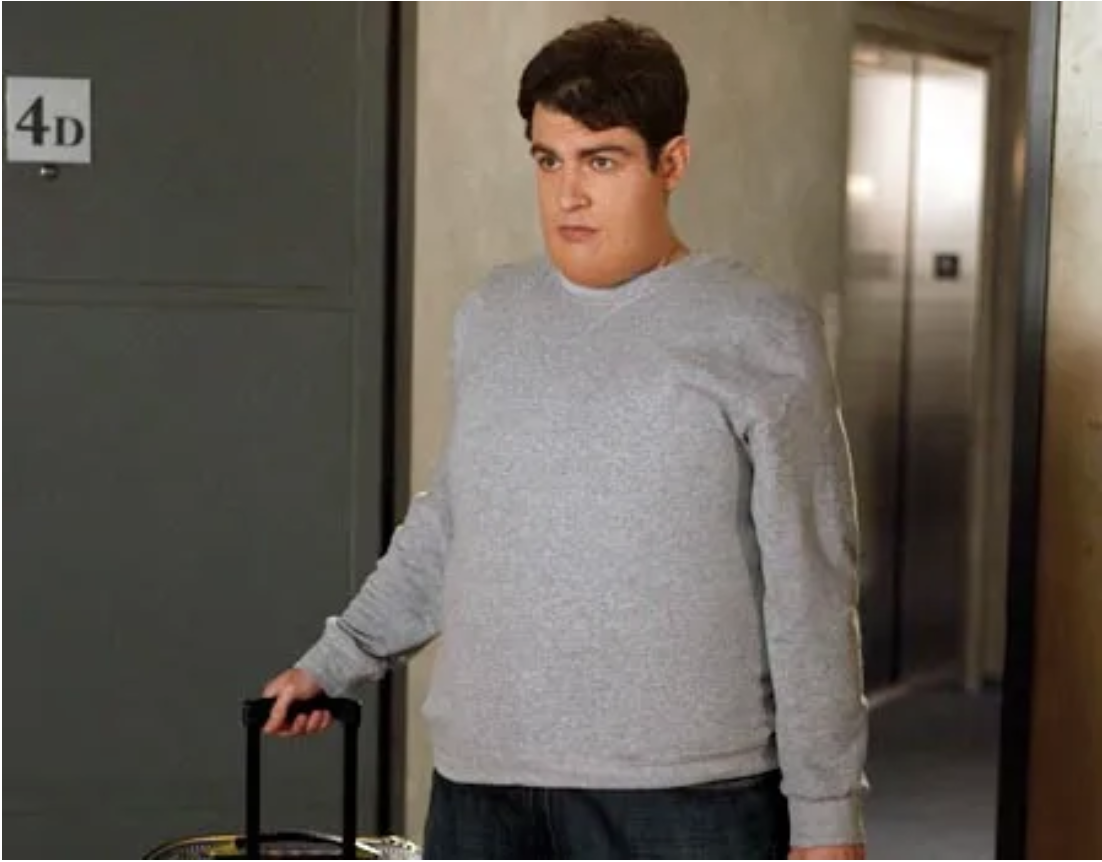Schmidt from New Girl is More than Just a “Douchebag”
by Delaney Fouts
Senior, Integrated Physiology Major
When we think of a comfort show, we want something lighthearted, funny, and easy to watch. For me, this has always been the series, New Girl … until recently. Let’s talk about why.
In a recent period of stress, I binge-watched the entire New Girl series, but this time, with bell hooks’ “oppositional gaze” (which is a term coined by bell hooks that encompasses how we can find pleasure in pointing out what is wrong with what we are viewing). Upon rewatching, I realized that one of the main issues that I take with the New Girl series is the character, Schmidt (Max Greenfield). Schmidt is so problematic that he literally has a “Douchebag Jar,” which he has to put money into when he is being a “douchebag.” Here’s a scene in which Schmidt first meets his love interest Cece (Hannah Simone) and other “douchebag” Schmidt moments.
Schmidt’s character is more than just a “douchebag” for several reasons, but there are a few in particular that have made me change my opinion to reject New Girl completely.
Schmidt is a self-proclaimed OCD (obsessive compulsive disorder) person, but in reality, his character is undermining people who actually struggle with OCD. Schmidt characterizes himself as having OCD because he likes his space to be in order and coordinated. This plays into the stereotypical trope of OCD, which is not reflective of the reality that people with OCD experience. OCD is a legitimate struggle for many people that goes beyond simply preferring an organized space. Portraying OCD as a funny personality trait that causes minor inconveniences and using it as a basis for entire episodes of the sitcom with the intention of being laughed at is unacceptable. Schmidt’s “OCD” is portrayed as being controlling and aggressive, which paints a negative picture of people with OCD. Here’s a scene to show an example of Schmidt’s “OCD” where we’re supposed to laugh (“Control”):
Are you laughing? Because I’m not.
Schmidt’s entire character is based on the idea that he used to be overweight, which he now believes gives him an excuse to objectify and eroticize women in a hypersexual, hypermasculine way. Schmidt, since losing weight, feels almost “reborn” and “has learned to use his parts,” which he implies he couldn’t do before losing weight.
Schmidt’s character exemplifies fat-phobia. The show implies that because Schmidt was fat, and he was made fun of, couldn’t be sexual, wasn’t able to find love, and was stuck in his career. He was only able to be happy and find love once he lost weight and became conventionally “attractive.” This idea about Schmidt’s past is highly problematic because it perpetuates the false ideas that 1. fat people can’t be happy, 2. fat people can’t find love, 3. fat people need to lose weight to progress in their lives. Obviously, none of these ideas are true.
Schmidt’s love interest in the series is Cece. Cece’s character is the supportive best friend, she is a model, and her character has very little depth aside from being an object for Schmidt to obsess over, sexualize, and even fetishize.
In Season 2, Episode 16 called “Table 34,” Schmidt follows (stalks?) Cece to an Indian dating convention and makes a speech to the room about how he thinks Cece is a “brown angel,” all while wearing a turban (which is a whole other issue on its own). Schmidt and Cece’s relationship begins as a “friends with benefits” situation where Cece is portrayed as enjoying Schmidt’s sexual attention. After Cece rejects Schmidt, his persistence is portrayed as endearing, but I would describe it more as stalking. He goes as far as sabotaging Cece’s wedding where she was supposed to marry another man, who Schmidt describes as “a small Indian man” who he decides Cece will never be happy with (“Elaine’s Big Day”). There are also many times where Schmidt fantasizes over him and Cece’s “caramel” baby, eroticizing her for being a woman of color (“Kids”).
One of the most disturbing scenes was when Cece had decided that she wanted to get a breast reduction to reduce her back pain. Season 4 Episode 7, called “Goldmine,” is almost entirely about Cece’s boobs and Schmidt’s desperation to stop her. He thinks of Cece as separate from her breasts and thinks that he has possession over her body parts, all while fetishizing her for being an Indian woman. Watch this scene (“Goldmine”):
Are you as disgusted as I am? Schmidt literally says that Cece doesn’t have a choice in this MEDICAL PROCEDURE that affects her and ONLY her. He says goodbye to Cece’s boobs, but not Cece when he thinks she’s going into the procedure and describes his experience as “grief” without any consideration for Cece’s health. Schmidt is blatantly objectifying Cece and to Schmidt, Cece is an object for his viewing pleasure. In Laura Mulvey’s words in Visual Pleasure and Narrative Cinema, "women are simultaneously looked at and displayed, with their appearance coded for strong visual and erotic impact so that they can be said to connote to-be-looked-at-ness" (Mulvey, 809). Throughout the series, Cece is solely a character meant to display “to-be-looked-at-ness” and to be eroticized by Schmidt.
Schmidt is often queer-coded throughout the series because he is a man who cares about his appearance and likes fashion. But the show writers make him a hyper-sexual, cis-het man who thinks it’s okay to sexualize women. Why would the series make Schmidt a straight man yet play into queer stereotypes? In one scene, the writers portray Schmidt as being gay and there are numerous scenes in which Schmidt kisses other men.
I appreciate that Schmidt is a straight man who is in-touch with his emotions and can form genuine friendships with men, but I wish that the writers had done this without constantly queer-coding his character. Watch this scene from “Goldmine.”
Most importantly, I want to address how Schmidt is blatantly racist and has a stereotypical, nuanced understanding of Cece’s (his friend and eventual fiancé’s) culture. Throughout the series, Schmidt’s limited understanding of Cece’s culture is meant to be lighthearted and funny, but it is really disappointing that Cece is not allowed to have representation and respect of her culture as an Indian woman. Watch this scene, in which Schmidt disrespects Indian culture and Cece, as a woman of color (“Cece Crashes”):
If you think that was bad, watch this IMDb video of “Table 34” in which Schmidt describes how he plans to go to Cece’s Indian dating convention…
… and this one when he pulls Cece aside to talk about how their sex was about “history, memory, and thousands of years of colonial suffering all being released in one moment of pure ecstasy” (“Table 34”):
I am in shock over these scenes. “White man need not apply,” “brown husband,” “more towels,” “white person’s toilet.”
Not to mention to cultural appropriation. I mean … HOW was this allowed to air on television. I. Am. Disgusted. These scenes are blatantly racist, but since it’s a sitcom, we’re supposed to be laughing. Schmidt’s character has several other downfalls. He is homophobic as he refuses to accept that his mom is gay and continuously calls her wife his “mom’s friend” (“Wedding Eve”). He is classist and fully believes that pine wood is “the wood of poor people and outhouses” (“Control”). Finally, his character depicts a very nuanced understanding of Judaism. Although Schmidt seems to be proudly Jewish, the series does very little to explore this aspect of his character and instead uses it as a punch line for jokes and reasons to make fun of Schmidt in numerous scenes.
I am choosing not to laugh. Instead, I am choosing to find joy in pointing out what is wrong with New Girl, and Schmidt in particular, through bell hooks’ “oppositional gaze.” I hope that we don’t see another character like Schmidt in future sitcoms, but I’m not confident that we won’t.
It seems like these types of characters- ones that are easy to make fun of, make brash comments, and have distinct lines and traits- are the ones that people latch onto the most as being those who “make” the show. People watch New Girl for Schmidt specifically, and, at one point, that was me too. I feel lucky that bell hooks guided me in changing my perspective with an “oppositional gaze” and I hope that others will change their perspectives too.





